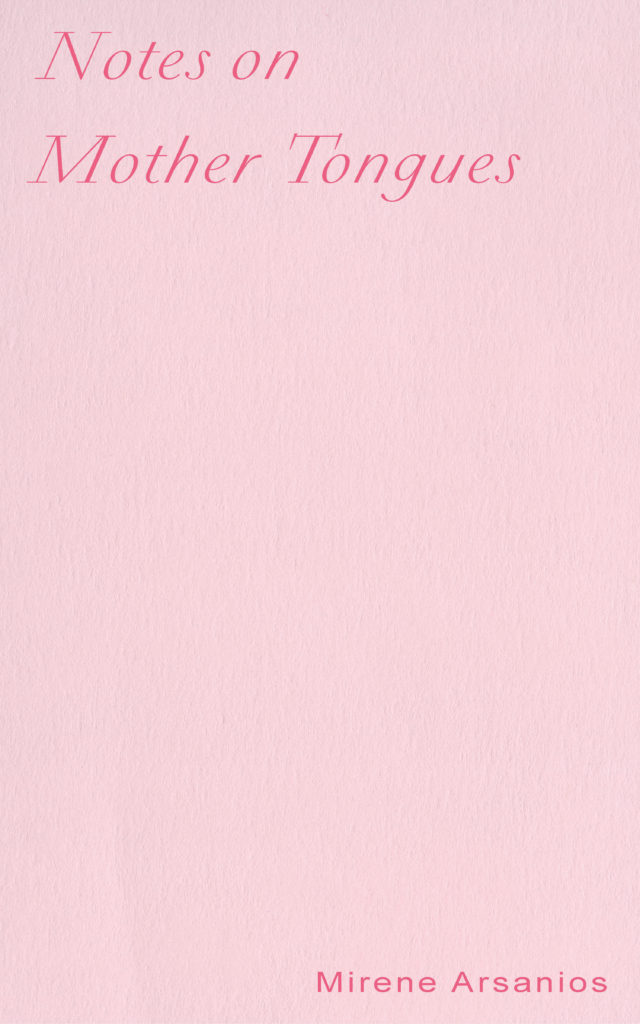Ugly Duckling Presse 2018
232 3rd St #E-303
Brooklyn NY 11215
347-948-5170

Notes on Mother Tongues: Colonialism, class, and giving what you don’t have
Mirene Arsanios
October 2020
My language isn’t argumentative. She believes that her lack of a primary language is the result of personal experiences compounded by structural circumstances, but she can’t prove it. I cannot demonstrate what my language is unable to prove. I speak of my language in the third person because knowing my language intimately means accepting the inherent split that exists between us, a dialectic of embodiment and estrangement that defines our relationship. My language is wary of my efforts; she doesn’t fully trust my ability to come up with a language that convincingly demonstrates that certain platitudes such as “everything is connected” are in fact true. I too have misgivings about my language; she can turn against me at any moment and deprive me of my words. She doesn’t know that at night, while she is asleep, I am awake, striving to come up with a syntax that can hold in a single sentence antithetical histories of ownership and dispossession, sentences in which the victim is also the perpetrator.
Lebanese writer and editor Mirene Arsanios meditates on the relationships between mother tongues, motherhood, and colonialism. In this pamphlet, she investigates the historical and personal circumstances that led to the loss of her “native” language. Written as a fictional essay, Notes on Mother Tongues explores language as a field shaped by diasporic histories, class relations, and broken familial legacies. It strives to imagine mother tongues and motherhood beyond the labor of reproduction—languages that exist in troubled ecosystems where lack does not preclude repair.
This pamphlet is part of UDP’s 2020 Pamphlet Series: twenty commissioned essays on collective work, translation, performance, pedagogy, poetics, and small press publishing. The pamphlets are available for individual purchase and as a subscription. Each offers a different approach to the pamphlet as a form of working in the present, an engagement at once sustained and ephemeral. To view a full list of pamphlets, click here.
About the Author
Mirene Arsanios is the author of the short story collection, The City Outside the Sentence (Ashkal Alwan). She has contributed essays and short stories to e-flux journal, Vida, The Brooklyn Rail, The Rumpus, and Guernica, among others. Arsanios co-founded the collective 98weeks Research Project in Beirut and is the founding editor of Makhzin, a bilingual English/Arabic magazine for innovative writing. She teaches at Pratt Institute and holds an MFA in Writing from the Milton Avery Graduate School for the Arts at Bard College. Arsanios currently lives in New York where she was a 2016 LMCC Workspace fellow, and an ART OMI resident in fall 2017. With Rachel Valinsky, she coordinated the Friday night reading series at the Poetry Project from 2017-19. Her book, The Autobiography of a Language, is forthcoming from Futurepoem.
Praise
Mirène Arsanios’s Notes on Mother Tongues is a decolonizing critical-poetic essay we need to read now. Thinking with brevity and brio through the idea of the “mother tongue,” Arsanios sings knowledge into life out of languagelessness, creatively writing against essentialisms and interrogating the historical dance between class and colonialism. Her praxis here embraces the “speculative,” the improvisatory, and the ghostly, ultimately bringing us closer to language’s truths.
John Keene
With all the luxurious love of the poets I take part in the sentences that Mirene Arsanios writes. They begin with words and end in places. This translative act incorporates the Englishes of elsewhere into the pleasure of reading for those of us who are often looking elsewhere to read.
Christopher Rey Pérez
In the News
Links
Publication Details
ISBN: 978-1-946433-48-0
Pamphlet
Saddle-stitched. 24 pp, 5 x 8 in
Publication Date: October 15 2020
Distribution: Asterism Books (US), Inpress Books (UK)
Series: 2020 Pamphlet Series

